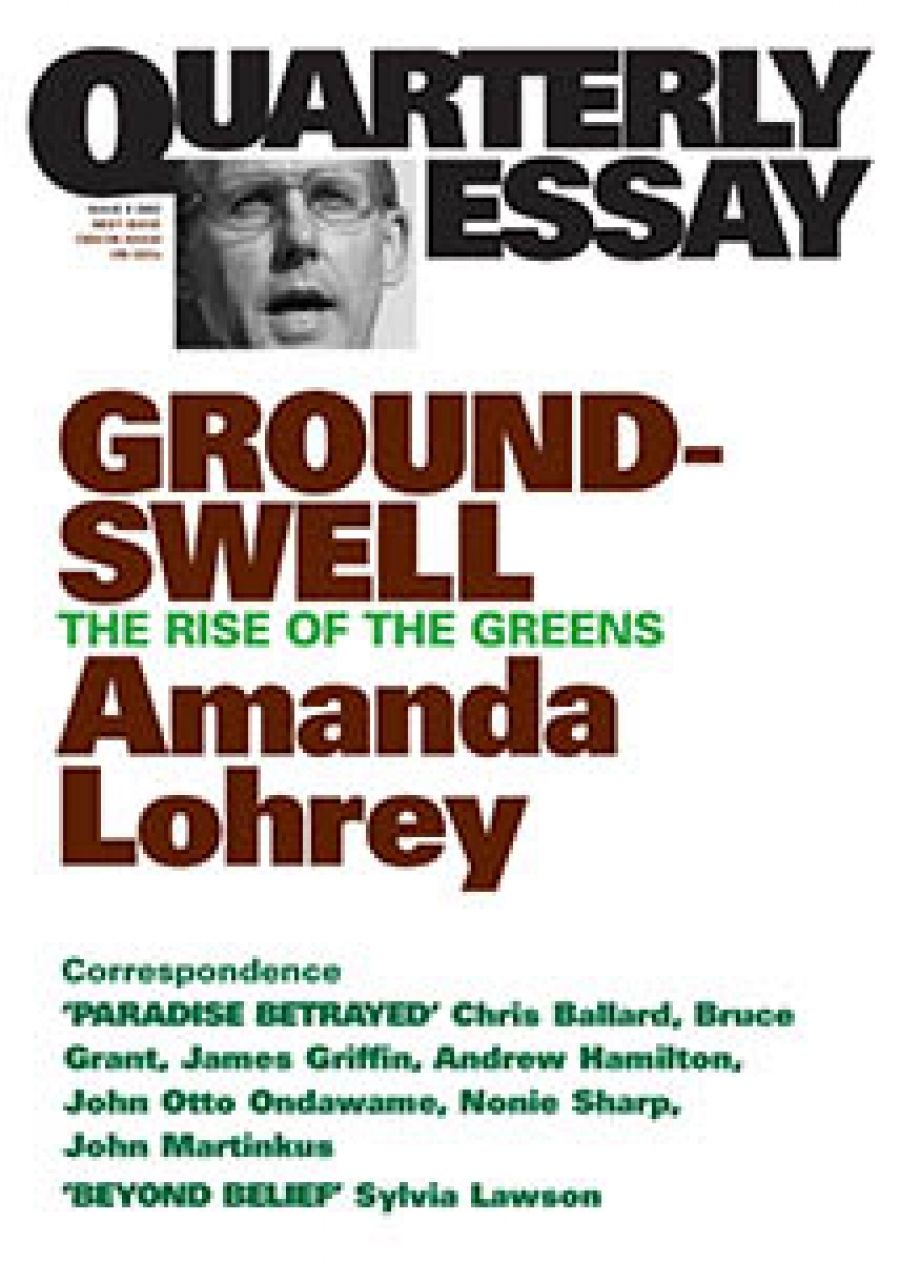
- Free Article: No
- Contents Category: Politics
- Review Article: Yes
- Article Title: The Next Wave?
- Online Only: No
- Custom Highlight Text:
First, a small tribute to Peter Craven and his colleagues for the establishment of Quarterly Essay (of which the above is the eighth issue). It is such a good idea that one wonders why it is such a recent innovation. A 20,000-word essay on an important contemporary issue, followed, in later issues, by responses to that essay, enable one to get one’s teeth into a matter of moment while it is still topical. The production is nicely done, too.
- Book 1 Title: Groundswell
- Book 1 Subtitle: The rise of the Greens
- Book 1 Biblio: Black Inc., $11.95 pb, 86 pp
Amanda Lohrey is a political scientist and novelist with a real interest in the Greens. If you want a comprehensive short history of the Greens movement, an account of the significant events that have formed it, a study of its varying electoral successes, an analysis of its leaders, and an attempt to set it in its international context, you can do no better than Groundswell. It is going to be well used in university politics essays.
My chief interest is in the Greens’ future. About that Lohrey is properly cautious, but in her closing paragraphs she seems to be arguing that a new basis for party politics is coming, and that it will have a strong ecological flavour. Ecology, she says, has moved in the last thirty years from the fringe to the centre of ‘a revised Enlightenment project’, which I take to be the best way to build a peaceful and progressive comity of nations (and of course a peaceful and progressive nation). The Greens ‘have the history, the passion and the unifying vision’ to be the authentic political representatives of the ecological constituency.
So far, so good. She points out that major parties seem to be in slow decline, because the proportion of voters placing them first has decreased from well in the nineties to less than eighty per cent. The Greens seem to be pushing past the Australian Democrats, and recent explosions in the latter party cannot have done it any good electorally. In New Zealand, the major party vote is down in the sixty per cent range. Is Australian politics going to follow the trans-Tasman example?
Mebbe so. Or, as Mandrake’s giant Nubian slave Lothar used to say, mebbe so not. If there is to be a new basis in Australian politics, it will have to bear some relation to the current one. On past experience, the present party system is likely to take over the ecological dimension in either one of two ways. The first is for both sides to adopt very similar positions. ‘We are all ecologists now!’ they will cry. Truth to tell, you won’t be able to see much difference between them in policies or practices. The Greens will then be pictured as impractical extremists, people who have no idea how the real world functions.
The second will be to adapt the ecological dimension to the current dispositions of Australian party politics. So the Liberal and National parties will take on board as much ecology as they can, while endeavouring to protect the interests of mining companies, farmers and graziers, manufacturers, and any other productive interest that feels threatened by ‘back to nature’ cries. The ALP will be happy enough to attack the traditional allies of the right-wing parties unless there are significant unions present whose members may be affected. That strategy too will keep the Greens as a minor player. It is the one currently used.
What is in question here is how Australians generally see their party system. More than thirty years ago, I argued that the reason the major parties survived and prospered was that they simplified the business of politics for citizens who did not want to be Athenian democrats weighing every issue and voting on everything. By and large, most of the time, it was straightforward for people to say ‘I’m Labor’ or ‘I’m Liberal’, because you had a pretty accurate sense of what that brand represented in practice, and you were reasonably happy with it. Every now and then, your party did something that really irritated you, and you would vote for the other side. Usually, you came home again at the next election. Desertions and departures were reasonably well-balanced, so that over the decades the major parties maintained their share of the vote. The outcome has been a system that minor groups find difficult to break into and, having managed to do so, to advance.
An earlier Quarterly Essay by John Button rather concurred with Amanda Lohrey in putting forward the view that the Labor Party has lost touch with its natural supporters because it has become the captive of the professional politicians and activists, and out of tune with Australians who want to see change. While people have said much the same at earlier periods in the history of the ALP, I agree with Button. There is something going on that could see a real shift in the ground upon which our party-political drama is played out. Yet I want to hang on to my earlier perspective: if the Greens are to be a major force in the future, they will need to rewrite the issues in our society from an ecological standpoint and make that rewriting familiar and acceptable to ordinary Australians. I think they are a fair way from that point at the moment.


Comments powered by CComment